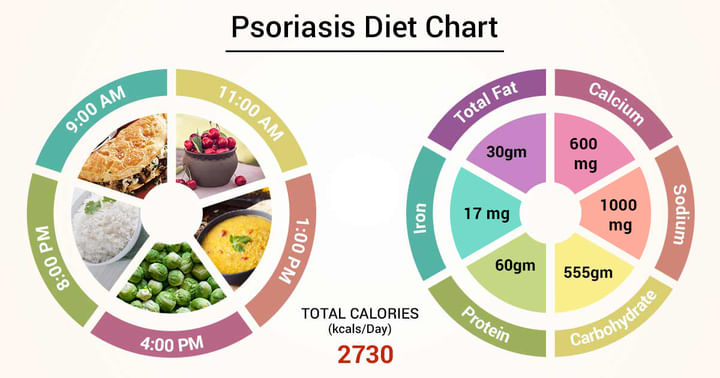Diet Chart For psoriasis treatment
Last Updated: Jan 20, 2025
About
Psoriasis is a skin disease marked by red, itchy, scaly patches which are caused due to a weak immune system. There is no concrete scientific evidence that specific food can impact psoriasis, but there is evidence that following a strict psoriasis treatment diet would help in losing extra weight and can ease the symptoms effectively. The psoriasis treatment diet is a balanced diet which helps to control the weight and also psoriasis, as well as lowers the risk of heart disease, diabetes and stroke. These diseases are elevated in people with psoriasis and therefore, utmost care should be taken. The foundation of psoriasis treatment diet is following a very healthy diet consisting of lean protein, low-fat dairy, whole-grains, fruits and vegetables. Psoriasis is an inflammatory condition and therefore, inflammation-fighting foods are recommended. Antioxidants like vitamin C, vitamin E, beta-carotene, and selenium make a huge difference.
Anti-inflammatory foods which should be consumed daily are as follows:
- Fruits and veggies such as berries, cherries and leafy greens
- Salmon, sardines and other fish rich in omega-3 fatty acids
- Antioxidant-rich herbs and spices, like thyme, sage, cumin, and ginger
- Heart-healthy sources of fat like olive oil, seeds, and nuts
Diet Chart
| Sunday | |
| Breakfast (8:00-8:30AM) | 1 cup skim milk + 1 vegetable omelette + 2 toasted bread |
| Mid-Meal (11:00-11:30AM) | 1 cup cherries + 4 walnuts |
| Lunch (2:00-2:30PM) | 1 cup moong dal + 1 cup cauliflower vegetable + 2 chapatti + beetroot salad |
| Evening (4:00-4:30PM) | 1 cup brussel sprout salad |
| Dinner (8:00-8:30PM) | 1 cup fish stew + 1 cup rice + salad |
| Monday | |
| Breakfast (8:00-8:30AM) | 1 cup skim milk + 1 cup vegetable poha |
| Mid-Meal (11:00-11:30AM) | 1 cup berries + 4 walnuts |
| Lunch (2:00-2:30PM) | salmon fish stew (1 cup) + 1 cup brown rice + 1 chapatti + carrot salad |
| Evening (4:00-4:30PM) | 1 cup broccoli and beetroot salad |
| Dinner (8:00-8:30PM) | 1 cup arhar dal + 1 cup methi mattar + 2 chapatti + salad |
| Tuesday | |
| Breakfast (8:00-8:30AM) | 1 cup skim milk + 2 vegetable moong dal cheela |
| Mid-Meal (11:00-11:30AM) | 1 cup watermelon smoothie + 4 walnut |
| Lunch (2:00-2:30PM) | 1 cup chana dal + 1 cup soybean vegetable + 2 chapatti + cucumber salad |
| Evening (4:00-4:30PM) | 1 cup spincach, corn and cottage cheese salad |
| Dinner (8:00-8:30PM) | 1 cup moong dal + 1 cup broad beans vegetable + 2 chapatti + salad |
| Wednesday | |
| Breakfast (8:00-8:30AM) | 1 cup skim milk + 2 moong dal cheela |
| Mid-Meal (11:00-11:30AM) | 1 cup cherries + 4 walnuts |
| Lunch (2:00-2:30PM) | 1 cup white chana + 1 cup palak paneer + 1 cup rice + 1 chapatti + beetroot salad |
| Evening (4:00-4:30PM) | 1 cup sweet potato chaat |
| Dinner (8:00-8:30PM) | 1 cup chicken curry+ 2 chapatti + salad |
| Thursday | |
| Breakfast (8:00-8:30AM) | 1 cup skim milk + 1 cup vegetable bread upma |
| Mid-Meal (11:00-11:30AM) | 1 cup berries + 4 walnuts |
| Lunch (2:00-2:30PM) | 1 cup moong dal + 1 cup beetroot curry vegetable + 2 chapatti + cucumber salad |
| Evening (4:00-4:30PM) | 1 cup vegetable soup |
| Dinner (8:00-8:30PM) | 1 cup soybean vegetable + 2 chapatti + salad |
| Friday | |
| Breakfast (8:00-8:30AM) | 1 cup skim milk +2 wheat dosa with paneer stuffing + coconut chutney |
| Mid-Meal (11:00-11:30AM) | 1 cup avocado/ banana smoothie + 4 walnut |
| Lunch (2:00-2:30PM) | 1 cup palak dal + 2 chapatti + 1 cup ghia raita + beetroot salad |
| Evening (4:00-4:30PM) | 1 cup moong dal sprouts salad |
| Dinner (8:00-8:30PM) | 1 cup mattar paneer vegetable + 1 cup rice + salad |
| Saturday | |
| Breakfast (8:00-8:30AM) | 1 cup vegetable idli + 1 cup sambhar + coconut chutney |
| Mid-Meal (11:00-11:30AM) | 1 cup cherries + 4 walnuts |
| Lunch (2:00-2:30PM) | 1 cup green beans curry + 1 cup rice + carrot salad |
| Evening (4:00-4:30PM) | 1 cup chickpea salad |
| Dinner (8:00-8:30PM) | 1 cup salmon fish curry+ 2 chapatti + salad |
Food Items To Limit
- Gluten : Gluten can be found in virtually every packaged and processed food, like pasta, cereal, candy, sauces, soups and dressings to name a few.
- Dairy : Dairy products such as milk, yoghurt, cheese, ice cream and chocolate contain casein increase the amount of inflammatory cytokines in the body, resulting in psoriasis to redden, flake and spread across the body.
- Sugar : Whether refined or unrefined, brown or white, liquid or powdered, sugar is an insidious pro-inflammatory food.
- Nightshade Foods : The reason behind this being that such foods contain alkaloids and lectins, two substances that can increase inflammation and hurt the intestines, especially for those who already suffer from an immune-mediated disease.
- Alcohol : While beer and harder alcohol (e.g. Gin, Vodka etc.) are essential parts of many people’s lifestyle who suffer with psoriasis, I can only suggest moderation, as excessive amounts of alcohol will almost certainly exacerbate existing symptoms.
Do's And Dont's
Do's:
- People who suffer from psoriasis would stand the problem of developing heart disease, so make sure that you include a lot of lean beef, poultry etc. in your diet as they have a protective action of the heart.
- Flaxseed: Flaxseed is a really good source of Omega-3 acid. This will help people control inflammation and also reduce chances of developing cholesterol.
- Green vegetables: Green vegetables is a rich source of omega 3 acid as well.
- Fruits and vegetables:Fruits and vegetables are good sources of vitamin A and C. They will be able to keep your skin healthy and reduce the inflammation and dehydration as well. Some good fruits and vegetables for psoriasis diet for patients include oranges, carrots, cantaloupes, berries, etc.
Don'ts:
- Foods with Omega 6 such as corn oil, sunflower oil, soybean oil, potato chips, cakes can cause high inflammation in the body, which will certainly not be good for people trying to develop an effective treatment for psoriasis through dieting.
- Fatty Foods : Fatty foods will not be good for a psoriasis diet for patients, for they are not very good for the inflammation problem.
- Sweet foods: Most sweet foods are fatty, which would enhance the chances of the side effects of psoriasis (such as weight gain, heart disease) become a big problem.
- Cholesterol laden foods: Some foods, such as oily foods, are really high in cholesterol content and might cause serious health problems, and aggravate the conditions of psoriasis in a person.
- Caffeine and alcohol: Caffeine and alcohol are ingredients that can cause dehydration, which is not so bad in normal circumstances, but can be horrible for patients suffering from psoriasis.
Food Items You Can Easily Consume
- Eat fish at least twice a week. Cold-water fish (such as albacore tuna, mackerel, salmon, herring, and lake trout) contain omega-3 fatty acids that can help lower your risk of coronary artery disease.
- Choose lean meats and poultry without skin. Prepare them without adding saturated fat or trans fat. Baking and broiling are heart-healthy ways to prepare lean meats and poultry.
- Use fat-free, 1 percent fat, and low-fat dairy products.
- Limit foods containing partially hydrogenated vegetable oils. They contain trans-fat.
- Shoot for less than 1,500 milligrams of sodium per day. Read food labels to see how much sodium you're consuming.
- Limit alcohol. If you have severe psoriasis, you may benefit from eliminating alcohol entirely. If you are going to have an occasional drink, the recommendations are: women no more than one drink per day, men no more than two.
- Keep an eye on your portion sizes. Consider weighing and measuring your food until you get used to appropriate sizes.
- Limit the amount of processed and fast food you eat.
References
- Wolters M. Diet and psoriasis: experimental data and clinical evidence. British Journal of Dermatology. 2005 Oct;153(4):706-14. [Cited 30 June 2019]. Available from:
- Debbaneh M, Millsop JW, Bhatia BK, Koo J, Liao W. Diet and psoriasis, part I: Impact of weight loss interventions. Journal of the American Academy of Dermatology. 2014 Jul 1;71(1):133-40. [Cited 30 June 2019]. Available from:
- Bhatia BK, Millsop JW, Debbaneh M, Koo J, Linos E, Liao W. Diet and psoriasis, part II: celiac disease and role of a gluten-free diet. Journal of the American Academy of Dermatology. 2014 Aug 1;71(2):350-8. [Cited 30 June 2019]. Available from:
- Millsop JW, Bhatia BK, Debbaneh M, Koo J, Liao W. Diet and psoriasis, part III: role of nutritional supplements. Journal of the American Academy of Dermatology. 2014 Sep 1;71(3):561-9. [Cited 30 June 2019]. Available from:
Table of content
Find Dietitian/Nutritionist near me
Ask a free question
Get FREE multiple opinions from Doctors



